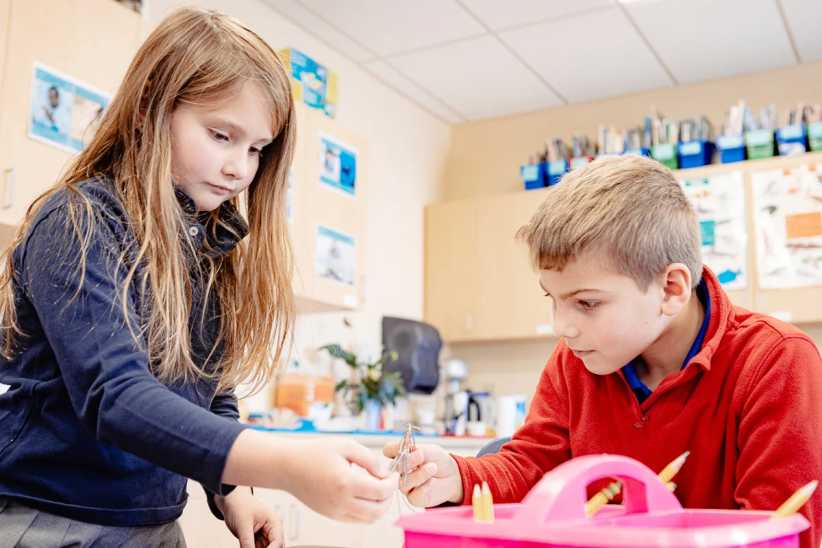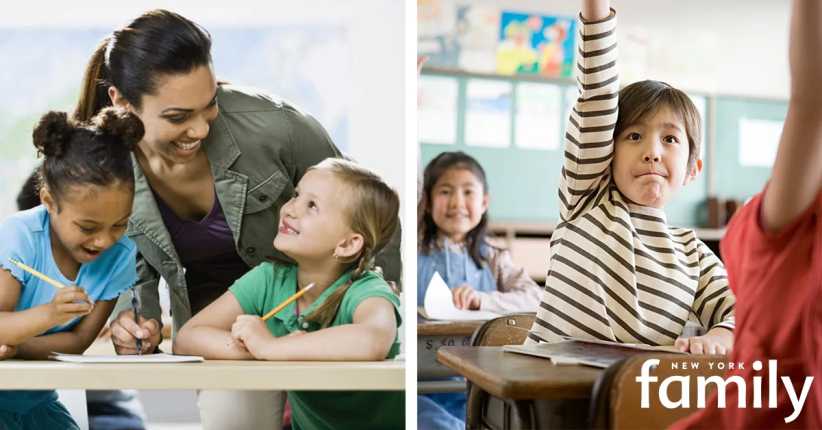Kids play together, sit in a circle with their teachers and sing songs, eventually moving to the table for a snack. Maybe they discuss the weather outside or the calendar, or learn about letters and numbers. From the outside, you’d be forgiven for seeing preschool as a nice-to-have, rather than a necessity—and, for those not in public pre-K programs, a potentially expensive option at that. Indeed, some parents have argued that preschool is simply a glorified day care, that anything taught there can easily be learned at home.
There is, however, more going on in that classroom than the untrained eye might observe. Educators and child development experts say that early childhood education offers kids advantages long after they leave the colorful walls of their preschool classroom and helps set them up for success in school and beyond. We’ve been hearing a lot about preschool from our political and educational leaders in recent years, as exemplified by New York City’s much-heralded push to provide universal pre-K. There is good reason that policymakers have zeroed in on this as an area where kids’ lives can be influenced for the better regardless of their backgrounds and situations.
Research shows that the benefits of preschool are tangible and visible in more ways than one. Preschool not only provides more opportunities for children, it helps them learn how to face social interactions as well, according to Rina Patel, a former preschool teacher and director of the early childhood enrichment program Book Nook, which is located on the Upper West Side of Manhattan. There are, as a result, big differences between at-home learning and in-school learning.
“There’s a different expectation at home when there is a parent with a child versus a teacher with a child,” Patel says. “Children do naturally develop skills, but at home they are only exposed to a certain amount of materials, toys, or learning products. School is open to a whole different variety of learning materials from programs to class trips.”
Trained Teachers and Groups of Peers
Schools provide teachers who are professionally trained to be molding young minds and are equipped with certain skills parents alone may not have. An important aspect of in-school learning is instilling in kids the ability to interact successfully with other people. It may seem very straightforward, but getting along with others, especially at 2-4 years old, is not so easy. Being in a classroom with multiple children their own age allows children to develop social and emotional skills that cannot be learned solely at home, Patel says.
At preschool, children become accustomed to being in group settings, separating from parents, and making decisions on their own—even if those decisions are as simple as, “Do I want to play with Legos or finger paint today?” All of the social experiences children undergo in preschool contribute to their overall confidence, according to Tovah Klein, Ph.D., author of How Toddlers Thrive and director of the Barnard College Center for Toddler Development.
“People think of it as the ABCs and 123s, but it’s much, much more than that,” Dr. Klein says. “Children gain a lot of confidence by being able to handle themselves away from their parents and then reuniting with them later in the day.”
Preschool classrooms also teach kids a great deal about resiliency and curiosity, according to Klein. Being able to handle disappointment and moving on from it, learning to be proud of your own work, and the ability to make decisions all play into a child’s curiosity and overall desire to learn.
RELATED: More Education Advice and Tips
Preparing Kids to Learn
Beyond the realm of confidence and social skills, going to preschool prepares children for life in various other ways, such as getting them ready to learn in school. This has become increasingly true in recent years as the kindergarten curriculum has been revamped. Today, skills such as reading are generally being taught earlier, prompting one study to ask, “Is kindergarten the new first grade?” With so much more expected of children at the kindergarten level, early education becomes crucial as preparation for the new rigors of kindergarten.
Various studies have shown that early education programs for 3- and 4-year-olds improve language skills, literacy, and mathematics. Attending preschool has been shown to improve children’s IQ, their receptive and expressive vocabulary skills, and early reading and math skills. By enrolling your child in a preschool program, you are preparing him to acquire academic skills that he will be expected to use as early as kindergarten, and offering him a head start in his academic career.
Studies show that a crucial part of preschool education lies in stimulating interactions between students and their preschool teachers. By supporting their students emotionally and academically, teachers help children learn to develop skills, respond both verbally and physically, and enjoy learning. Young children often struggle with the transition from a play environment to a learning environment, which can cause a “learning anxiety,” or fear of learning, according to Patel. By introducing your child to this learning environment as early as preschool, you eliminate the anxiety as early as possible, preparing her for future learning.
Teaching Kids Routine
Preschool also helps children develop and understand the concept of a routine. The school day is structured, which helps acclimate children into a daily routine and a learning environment in a gentle and enjoyable way. Being accustomed to a routine helps children prepare for higher levels of grade school, college, and a professional life, according to Patel.
“When I was in a kindergarten classroom with children who didn’t go to preschool prior to entering, they were experiencing social anxiety and learning anxiety simply because they didn’t know what to expect,” Patel says. “Preschool fills those separation and learning anxieties so your child has a better idea and is better prepared for the future.”
In the process of preparing a child for a routine, parents likewise become accustomed to enforcing and sticking to that routine. The earlier you start bringing your child to a structured program such as preschool every day, Patel says, the earlier you learn the importance of an everyday routine for your child. An aspect that is also beneficial for parents is that the earlier you begin, the earlier you can decide what works for you and your child and what doesn’t.
By sending your child to preschool, experts say, he will be provided the resources necessary for proper academic preparation, and social and emotional development. Plus, she will learn more about herself than she could ever do from your living room.
RELATED: Find a Preschool Near You
Sign up for our newsletter to receive the latest updates on fun events and other family activities in your area.






















